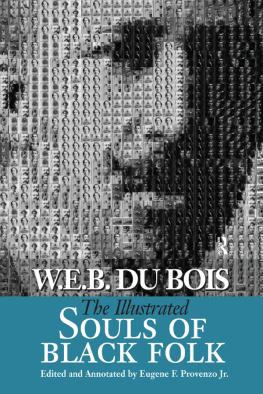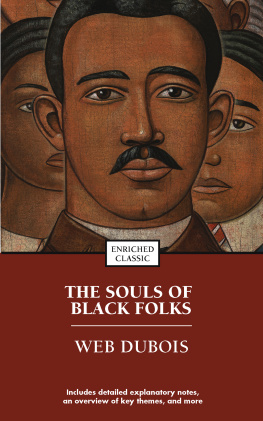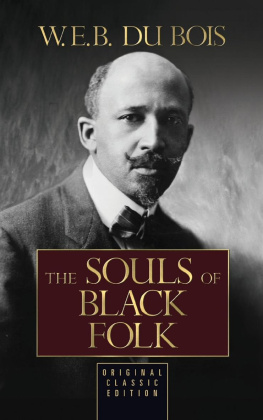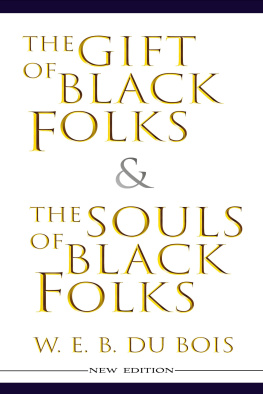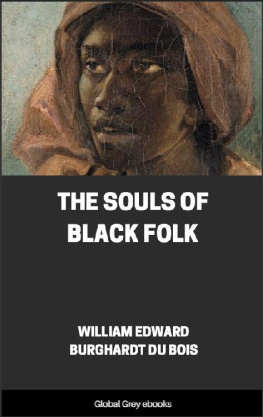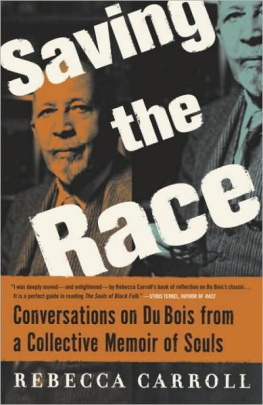Du Bois - The Illustrated Souls of Black Folk
Here you can read online Du Bois - The Illustrated Souls of Black Folk full text of the book (entire story) in english for free. Download pdf and epub, get meaning, cover and reviews about this ebook. publisher: Taylor & Francis (CAM), genre: Science. Description of the work, (preface) as well as reviews are available. Best literature library LitArk.com created for fans of good reading and offers a wide selection of genres:
Romance novel
Science fiction
Adventure
Detective
Science
History
Home and family
Prose
Art
Politics
Computer
Non-fiction
Religion
Business
Children
Humor
Choose a favorite category and find really read worthwhile books. Enjoy immersion in the world of imagination, feel the emotions of the characters or learn something new for yourself, make an fascinating discovery.
The Illustrated Souls of Black Folk: summary, description and annotation
We offer to read an annotation, description, summary or preface (depends on what the author of the book "The Illustrated Souls of Black Folk" wrote himself). If you haven't found the necessary information about the book — write in the comments, we will try to find it.
The Illustrated Souls of Black Folk — read online for free the complete book (whole text) full work
Below is the text of the book, divided by pages. System saving the place of the last page read, allows you to conveniently read the book "The Illustrated Souls of Black Folk" online for free, without having to search again every time where you left off. Put a bookmark, and you can go to the page where you finished reading at any time.
Font size:
Interval:
Bookmark:
The Illustrated Souls of Black Folk
The Illustrated Souls of
Black Folk
W. E. B. Du Bois
Edited and Annotated by
Eugene F. Provenzo Jr.
with a Foreword by
Manning Marable
An Annotated, Illustrated, Documentary Edition

First published 2005 by Paradigm Publishers
Published 2016 by Routledge
2 Park Square, Milton Park, Abingdon, Oxon OX14 4RN
711 Third Avenue, New York, NY 10017, USA
Routledge is an imprint of the Taylor & Francis Group, an informa business
Copyright 2005, Taylor & Francis.
All rights reserved. No part of this book may be reprinted or reproduced or utilised in any form or by any electronic, mechanical, or other means, now known or hereafter invented, including photocopying and recording, or in any information storage or retrieval system, without permission in writing from the publishers.
Notice:
Product or corporate names may be trademarks or registered trademarks, and are used only for identification and explanation without intent to infringe.
Library of Congress Cataloging-in-Publication Data has been applied for.
ISBN 13: 978-1-59451-030-4 (hbk)
ISBN 13: 978-1-59451-031-1 (pbk)
To
BURGHARDT AND YOLANDE
The Lost and the Found
___________________
Manning Marable
Eugene F. Provenzo Jr.
Eugene F. Provenzo Jr.
The Souls of Black Folk has remained the most influential text about the African-American experience for a century. Even Du Boiss contemporaries, whether agreeing or dissenting from the books various arguments, understood its unique power as a work of literature. In the books most important quote: The problem of the twentieth century is the problem of the color-line, Du Bois presciently set forth what would be the most important social issue in American culture for his generation and the generation that followed him.
Why was the book so important? I believe that Du Bois had given the emerging black middle class a lyrical language of racial reform. Souls was to the black American petit bourgeoisie what The Communist Manifesto had once been for sectors of the European proletariat under industrial capitalism in the late nineteenth century: a framework for understanding history, a philosophical statement establishing group identity and social location within societys unequal hierarchy, and an appeal for collective action and resistance to oppression and exploitation.
In Souls, culture and politics are inextricably linked, as part of the process of group self-awareness and affirmation. As the cultural studies theorist Stuart Hall has explained, Du Bois used language and ideas to hammer out a strategy for political equality, and to sound the depths of the black experience in the aftermath of slavery. The Souls of Black Folk, for the first time in history, tried to paint for white America a vivid portrait of black people in the decades after emancipation in 1862how they lived and who they really wereand thus to enlighten white America (still profoundly attached to myths of black inferiority) as to the true meaning of being black in post-Civil War America.
Du Bois reflected shortly after the publication of Souls how he had deliberately employed throughout the text a personal and intimate tone of self-revelation. In each essay I sought to speak from withinto depict a world as we see it who dwell therein.
This edition of The Souls of Black Folk, edited by Eugene F. Provenzo Jr., expands and elaborates on Du Boiss work in ways that resonate with the original intention and purpose of the book. By annotating the work, and drawing on period documents and sources, as well as photographs and illustrations, Provenzo extends Du Boiss desire to speak from withinto depict a world as we see it who dwell therein. In doing so, he takes a classic and revolutionary work in American history, and not only makes it more accessible, but enriches it in ways that one is confident that Du Bois would heartily agree with and applaud.
Manning Marable
This foreword draws on the introduction I wrote to The Souls of Black Folk, 100thAnniversary Edition by W. E. B. Du Bois (Boulder, Colorado: Paradigm Publishers, 2004).
Stuart Hall, Tearing Down the Veil, Guardian (London), February 22, 2003.
W. E. B. Du Bois, The Souls of Black Folk, Independent, vol. 57, no. 2920 (November 17, 1904), p. 1152
One can legitimately ask why there is a need to publish a new edition of W. E. B. Du Boiss masterpiece, The Souls of Black Folk. There are already numerous editions available, including an annotated version by the distinguished African-American scholar Henry Louis Gates Jr. In part, this edition is intended to celebrate the 100th anniversary of the publication of the book. Like Gatess edition of The Souls of Black Folk, this edition is annotated and also includes a critical introduction. It also provides pictorial and documentary sources to supplement the text.
I have drawn on period documents and sources, as well as illustrations and photographs, to supplement this text. Of greatest interest to me are the materials from The Exhibit of the American Negroes that was part of the 1900 Paris International Exposition. It is, in fact, the thesis of this work that much of the information and conceptualization of The Souls of Black Folk is a direct outgrowth of Du Boiss involvement with this pioneering and largely unheralded exhibit of sociological, cultural, and literary artifacts. As will be demonstrated in this work, echoes of the Paris exhibit can be found throughout The Souls of Black Folk.
I believe that there is a great deal that is new that can be said about The Souls of Black Folk. I also believe that different perspectives can prove helpful in looking at Du Bois and his work. I am a historian by training, and a cultural theorist and cultural archeologist by practice. Du Bois has particularly caught the attention of literary scholars in recent years, and while their insights are useful, they are by no means complete. The reader can be the judge of whether or not I have something new to contribute.
Finally, I am interested in creating an edition of The Souls of Black Folk that can be of particular use to scholars and students. I hope this work, through the inclusion of extensive illustrated materials and photographs, as well as original documents and sources from the period (written by both Du Bois and his contemporaries), will provide the reader with a deeper understanding of Du Boiss work and its significance not only as an historical document, but also as one of the most important political and cultural texts of the twentieth century.
In this special edition, each section or chapter of Du Boiss original work is accompanied by, not only annotations and illustrations, but also by a selected set of documents at the end. I have chosen these materials because of their relevance to the information and arguments made by Du Bois. In doing so, I hope to extend the readers access to related documents and resources, as well as add to the richness of this already engaging text.
I would like to thank the many people who have helped and encouraged me in my work on this project. Dean Birkenkamp at Paradigm Publishers has shown particular imagination and enthusiasm for this project. In doing so, he gives one faith in the enterprise of publishing and the creation of new books. Also special thanks go to Dianne Ewing, Michael Peirce, Beth Davis, and Alison Sullenberger at Paradigm Publishers.
Font size:
Interval:
Bookmark:
Similar books «The Illustrated Souls of Black Folk»
Look at similar books to The Illustrated Souls of Black Folk. We have selected literature similar in name and meaning in the hope of providing readers with more options to find new, interesting, not yet read works.
Discussion, reviews of the book The Illustrated Souls of Black Folk and just readers' own opinions. Leave your comments, write what you think about the work, its meaning or the main characters. Specify what exactly you liked and what you didn't like, and why you think so.

